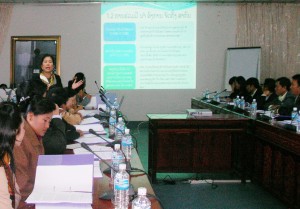
BasicNeeds has coordinated regular meetings with government and other agencies on mental health policy
We recently received a request to develop material on policy entrepreneurship for a professional group working on improved policy frameworks for mining in a country in South America. Within a local policy environment that was effectively paralysed on the subject of mining, the group was seeking to find a way forward. They believed, as they put it, that mining could be a tool for development.
Taking a different approach to conventional NGO advocacy methods, policy entrepreneurship is the process of forging a collective effort to support policy development and change. In writing on the subject in ‘Policy Entrepreneurs and Change Strategies (2010)’, Meijerink and Huitema presented an analysis of case studies from sixteen countries spanning five continents. They offered insights on the ways in which conventional business development methods such as building networks, identifying opportunities and brokering partnerships, can apply to policy.
The extent to which policy entrepreneurship is simply a new way of framing political lobbying is open to debate. Attempts to influence policy to benefit a particular group within society is part and parcel of everyday governance. Negative gearing in the Australian housing market is one example. Disputes over the management and use of water is another. In this context, policy development can be subject to manipulation and exploitation.
On the other hand, enterprise in policy is surely welcome. For subjects like infrastructure, energy, health and education, where the gains and losses from a particular development in policy fall heavily across society, there is a need for coalitions to be built. New perspectives need to be sought and a productive means of overcoming barriers have to be discovered. The example above of the mining policy group is a good one. If valuable mineral resources are available in a poor region, then the right kind of policy entrepreneurship ought to be one way to explore options. The result could be a transition to a new policy framework in which the benefits and their distribution far outweigh the losses.
Too often, the voices of important groups in society do not feature in collective efforts on policy development. The challenge for policy entrepreneurship is to achieve awareness and participation beyond a narrow set of interest groups.


